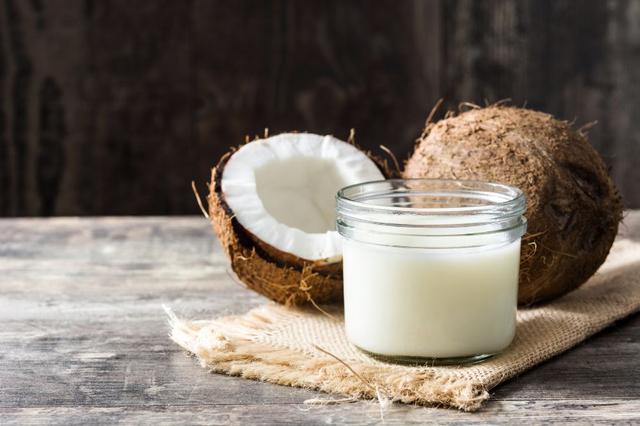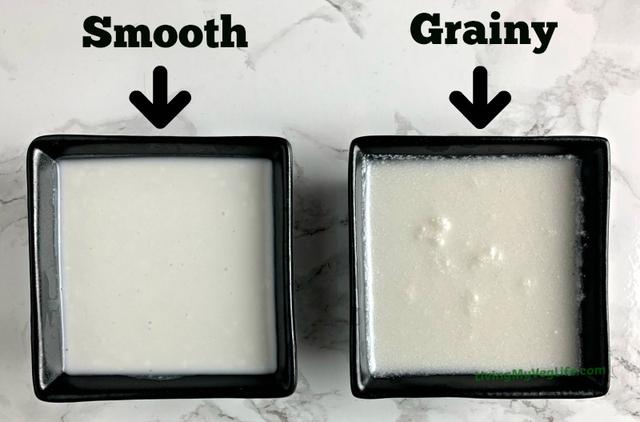
“Discover the Shelf Life of Coconut Milk: Uncover the secrets behind how long coconut milk stays fresh and delicious. From storage tips to expiry dates, get expert insights on prolonging the lifespan of this versatile dairy alternative. Don’t miss out on enjoying your favorite recipes with the perfect coconut milk consistency!”
How Long Does Coconut Milk Last?
The lifespan of coconut milk depends on the type of coconut milk you are using. Canned coconut milk can last for a very long time while it’s still in the can, typically stored in the pantry. Once opened, it should be transferred to an airtight container and refrigerated, where it will last for about 4 to 7 days.

Coconut milk sold in cartons as a dairy milk substitute usually has a longer shelf life due to the inclusion of stabilizers and preservatives. An unopened carton can generally last for several months if stored in a cool, dry place away from direct sunlight. However, once opened, it should be refrigerated and used within 7 to 10 days.
Fresh coconut milk extracted directly from a coconut has a shorter lifespan compared to canned or carton coconut milk. It can last for about 4 to 6 days when stored in the refrigerator. To extend its shelf life, fresh coconut milk can be frozen for up to 3 months when stored in an airtight container or sealed plastic bag.
Canned Coconut Milk
Canned coconut milk is a popular option for cooking, especially in dishes like Panang Curry or Coconut Curry Chicken. When unopened and stored in a pantry, canned coconut milk can last for a very long time. However, once opened, it should be transferred to an airtight container and refrigerated. Properly stored, opened canned coconut milk will typically last for about 4 to 7 days.
Coconut Milk in a Carton
Coconut milk sold in cartons is typically used as a dairy milk substitute and is often consumed on its own or added to beverages like coffee or tea. This type of coconut milk is processed and contains stabilizers and preservatives to extend its shelf life. An unopened carton of coconut milk can generally last for several months if stored in a cool, dry place away from direct sunlight. It is important to check the expiration or best-by date on the package to determine its specific shelf life. Once the carton is opened, it should be refrigerated and used within 7 to 10 days. It’s crucial to check for signs of spoilage such as an off smell, curdling, or mold before using the milk. If any of these signs are present, the milk should be discarded.
If you have fresh coconut milk or canned coconut milk that you haven’t used, you can extend its shelf life by storing it in the freezer. Transfer the liquid into cube trays or an airtight container or bag before placing it in the freezer. However, it’s worth noting that this method may cause the texture of the coconut milk to become grainy once thawed. The flavor will remain unchanged, so this method may be suitable for dishes where texture is not a major concern.
Remember to always follow manufacturer’s recommendations on packaging for storage guidelines as they may vary by brand and formulation. Additionally, conducting visual checks, smelling tests, and taste tests can help determine if coconut milk has gone bad and should be discarded. Storing coconut milk properly and being aware of its lifespan after opening will ensure that it remains safe for consumption and maintains its quality.
Fresh Coconut Milk
Fresh coconut milk, which is obtained directly from a fresh coconut, can add a unique flavor and texture to various dishes. However, it has a shorter lifespan compared to canned or carton coconut milk. When properly stored in the refrigerator, fresh coconut milk can last for about 4 to 6 days. To extend its shelf life, you can freeze fresh coconut milk for up to 3 months by storing it in an airtight container or sealed plastic bag.
It’s important to note that fresh coconut milk does not have the same creamy consistency as canned coconut milk. Therefore, it may not be commonly used for cooking purposes but rather enjoyed as a beverage or ingredient in desserts. To ensure the freshness and quality of your fresh coconut milk, always conduct visual checks for any signs of discoloration or mold before using it. Additionally, perform a smell test to detect any foul or sour odors that may indicate spoilage. If you notice any negative changes in appearance, smell, or taste, it’s best to discard the fresh coconut milk and not consume it.
Why Does It Need to Be Refrigerated?

Coconut milk needs to be refrigerated after it has been opened because it is a highly moist and high oil content liquid. Exposing it to room temperature or humidity can cause it to spoil faster and increase the risk of harmful bacterial growth, such as Staphylococcus aureus. Refrigerating coconut milk helps to slow down the growth of bacteria and preserve its freshness for a longer period of time.
Additionally, canned coconut milk contains preservatives like potassium dichromate that help extend its shelf life at room temperature. However, once the can is opened, it is important to transfer any unused portion into an airtight container and store it in the refrigerator to maintain its quality and prevent spoilage.
Refrigeration also helps to retain the creamy texture and flavor of coconut milk. The cold temperature helps to keep the fats in the milk from separating or solidifying, ensuring that it remains smooth and enjoyable when used in cooking or as a dairy milk substitute.
How to Check if Coconut Milk Has Gone Bad?

Coconut milk, like any other food, can go bad over time. To check if coconut milk has gone bad, there are a few things you can look for. Firstly, visually inspect the coconut milk. It should have an opaque creamy white color. If it appears yellow or has mold on the can or surface of the liquid, it is a sign that it has spoiled and should be discarded immediately.
Another way to determine if coconut milk has gone bad is by smelling it. Good coconut milk will have a pleasant coconut aroma. However, if it emits a foul, sour odor, it is an indication that it has gone rancid and should not be consumed.
Lastly, you can do a taste test to check the quality of the coconut milk. Take a small amount and taste it. If it has an acidic and sour flavor, it means that the coconut milk has gone bad or is on its way to spoiling.
It’s important to note that properly storing coconut milk can help extend its shelf life and prevent spoilage. Unopened cartons or cans of coconut milk should be stored in a cool, dry place away from direct sunlight. Once opened, coconut milk should be refrigerated and used within 4 to 10 days depending on the type (canned or carton).
By following these guidelines and regularly checking for signs of spoilage, you can ensure that your coconut milk stays fresh and safe to consume.
Check the Expiration Date
When it comes to determining the freshness and safety of coconut milk, checking the expiration date is crucial. Most canned or carton coconut milk will have an expiration or best-by date printed on the packaging. If it has passed this date, it is best to discard the milk to avoid any potential health risks.
An easy way to assess the quality of coconut milk is by conducting a visual inspection. Fresh coconut milk should have an opaque creamy white color. If there are any yellow hues or signs of mold on the can or the liquid’s surface, it is a clear indication that the milk has gone bad and should not be consumed.
The smell of coconut milk can also provide valuable information about its freshness. Good coconut milk will have a pleasant coconut aroma. However, if it emits a foul, sour odor, it is a sign that the milk has turned rancid and should be discarded.
If you are still unsure about the quality of your coconut milk, you can do a taste test. Take a small amount of the milk and taste it. If it has an acidic or sour flavor, this indicates that the milk has gone bad and should not be consumed.
To extend the shelf life of unopened coconut milk, store it in a cool, dark place away from direct sunlight. Refrigeration is necessary once opened for both carton and canned coconut milk to prevent spoilage and bacterial growth.
Do a Visual Check
When determining if your coconut milk has gone bad, one of the first things you should do is a visual check. Good coconut milk should have an opaque creamy white color. If you notice any yellow hues or signs of mold on the can or the surface of the liquid, it is likely spoiled and should be discarded immediately. It’s also normal for canned coconut milk to develop chunky curds due to its high amount of saturated fat, so don’t be alarmed if you see lumps in the liquid.
An effective way to determine if your coconut milk has gone rancid is to give it a smell test. Fresh and good-quality coconut milk will have a pleasant coconut aroma. However, as it spoils, it will emit a foul and sour odor. If you notice this off-putting smell, it’s a clear indication that the coconut milk has gone bad and should not be consumed.
If you’re still unsure about the quality of your coconut milk after conducting a visual check and smelling it, you can perform a taste test. Take a small amount of the liquid on a spoon and taste it. If the flavor is acidic and sour, it means that the coconut milk has either gone bad or is on its way to spoilage. It’s best not to consume it at this point.
Smell the Milk
One way to determine if coconut milk has gone bad is by smelling it. Good coconut milk will have a pleasant, coconut aroma. However, if it emits a foul or sour odor, that means it has likely spoiled and should not be consumed.
Another way to assess the freshness of coconut milk is by checking its appearance. Fresh coconut milk should have an opaque creamy white color. If it has turned yellow or there are signs of mold on the can or the surface of the liquid, it is best to discard it.
If you’re still unsure about the quality of your coconut milk, you can do a taste test. Take a small amount and taste it. If it has an acidic and sour flavor, that indicates spoilage and it’s best not to consume it.
Conduct a Taste Test
One way to determine if coconut milk has gone bad is to conduct a taste test. Take a small amount of the milk and taste it. If it has an acidic and sour flavor, this indicates that the milk has spoiled or is on its way to spoiling. It’s best not to consume it at this point.
In addition to conducting a taste test, you can also check the appearance and smell of coconut milk to determine if it has gone bad. Good coconut milk should have an opaque creamy white color. If it has yellow hues or signs of mold, discard it immediately. Smelling the coconut milk is another way to detect spoilage. Fresh coconut milk will have a pleasant coconut aroma, while spoiled coconut milk will emit a foul, sour odor.
To extend the shelf life of unopened coconut milk, store it in a cool and dark place, such as your pantry. Avoid storing it in areas with direct sunlight or high humidity, as this can promote bacterial growth. If you have unused fresh or canned coconut milk, you can freeze it in cube trays or transfer it to an airtight container or bag and store it in the freezer. Keep in mind that freezing may alter the texture of the milk, making it grainy once thawed.

How to Properly Store Coconut Milk?
Coconut milk should be stored properly to ensure its freshness and prevent spoilage. Here are some guidelines for storing coconut milk:
– Canned coconut milk: If you have opened a can of coconut milk and have leftovers, transfer the remaining milk to an airtight container and refrigerate it. It can last for about 4 to 7 days when stored in the refrigerator.
– Carton coconut milk: An unopened carton of coconut milk can be stored in a cool, dry place away from direct sunlight. Check the expiration or best-by date on the package to determine its specific shelf life. Once opened, refrigerate the carton and use within 7 to 10 days.
– Fresh coconut milk: If you have extracted fresh coconut milk from a coconut, it can last for about 4 to 6 days in the refrigerator. To extend its shelf life, you can freeze it for up to 3 months in an airtight container or sealed plastic bag.
Remember that once opened, canned and carton coconut milk should be refrigerated immediately after use to prevent spoilage. Always check for signs of spoilage before consuming coconut milk, such as an off smell, curdling, or mold. Follow the manufacturer’s recommendations on packaging for specific storage guidelines.
Keep it at Room Temperature
Canned coconut milk can be stored at room temperature until it is opened. This is because it contains preservatives that help to extend its shelf life. However, once the can is opened, any remaining coconut milk should be transferred to an airtight container and refrigerated immediately. This will help to prevent bacterial growth and ensure that the coconut milk stays fresh for as long as possible.
When purchasing carton coconut milk, it is important to check the expiration or best-by date on the package. Unopened cartons of coconut milk can generally last for several months if stored in a cool, dry place away from direct sunlight. However, once opened, carton coconut milk should be refrigerated and used within 7 to 10 days. It is also important to visually inspect the milk for any signs of spoilage before consuming it.
If you have fresh coconut milk or canned coconut milk that you haven’t used, you can extend its shelf life by storing it in the freezer. Transfer the liquid into cube trays or an airtight container or bag before freezing. While this may cause the texture of the coconut milk to become grainy once thawed, the flavor will remain unchanged. This method is particularly useful if you do not need a creamy texture in your dish.
Freeze the Milk
If you have leftover coconut milk that you won’t be able to use within the recommended storage time, freezing it is a great option to extend its shelf life. Transfer the coconut milk into ice cube trays or an airtight container or bag, making sure to leave some space for expansion. Place it in the freezer and allow it to freeze completely. Frozen coconut milk can last for up to 3 months when stored properly.
It’s important to note that freezing coconut milk might change its texture, making it grainy once thawed. However, the flavor will remain unaffected, so this method is suitable for dishes where texture is not crucial.
In conclusion, coconut milk can last for about 4-7 days in the refrigerator, while canned coconut milk can be stored for up to a year. Proper storage and usage of coconut milk is crucial to maintain its freshness and quality. Always check for signs of spoilage before consuming.
Learn More About Grilling
If you want to learn more about grilling, check out these other helpful resources!











